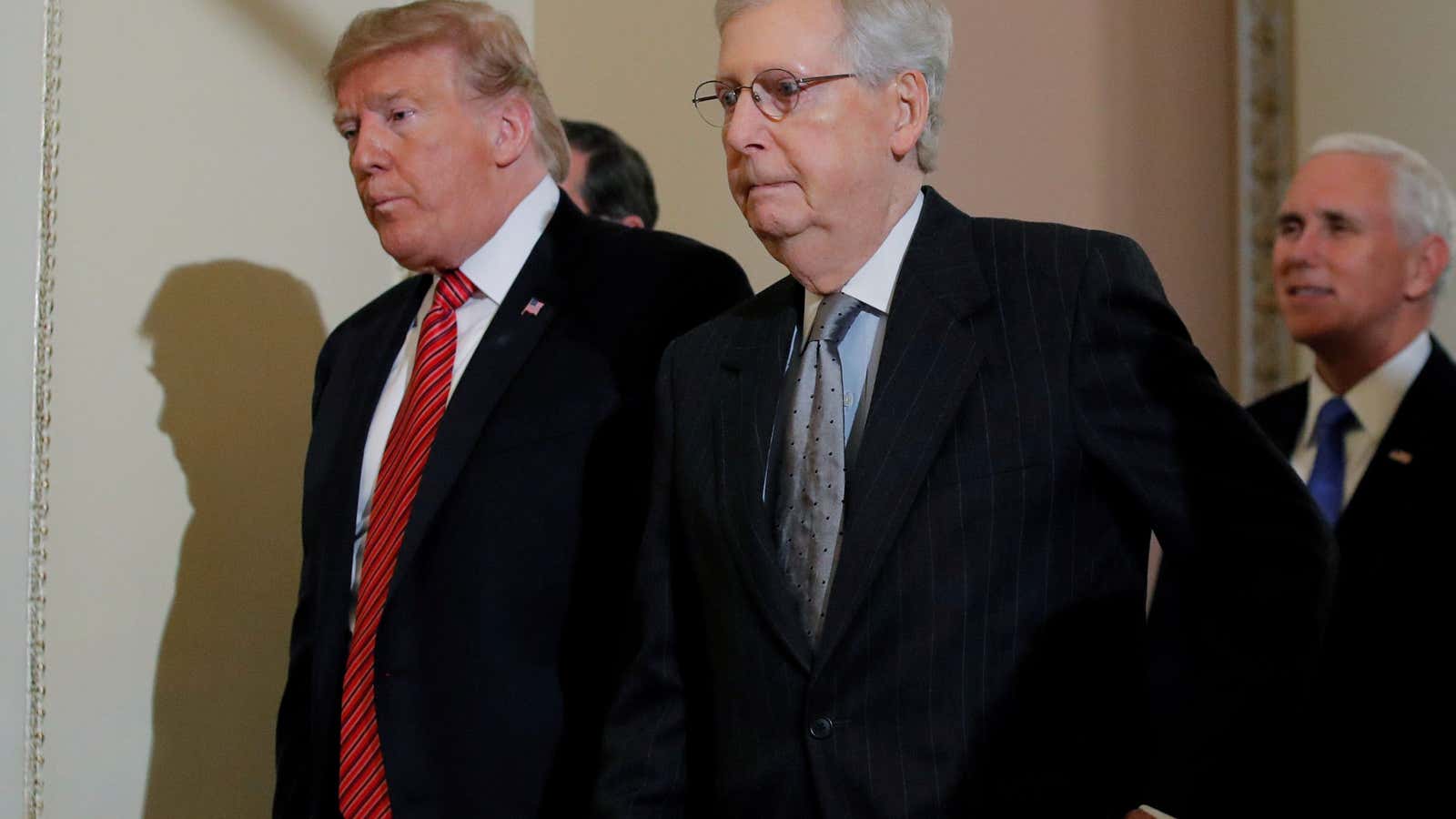The US Senate will vote Thursday (Jan. 24) on a proposal that could end the stalemate over funding for a wall on the border with Mexico that has kept parts of the US government closed for 32 days.
On Tuesday afternoon, Chuck Schumer, the New York Democrat, introduced a continuing resolution to temporarily fund the government. It would allow agencies to be funded and workers to collect back pay, but doesn’t address the wall issue at all. Senate Majority leader Mitch McConnell will allow a vote on the floor on the measure.
The US government has been partially shut for 32 days, a record, as Trump and Republicans battle with Democrats over funding for the border wall. A new crop of House Democrats who were elected on promises to curb Trump’s actions on immigration have so far refused to approve the money. The upcoming Senate vote is the first sign Republicans might be ready to compromise.
The resolution has already passed the House; if it passes the Senate, it could still be vetoed by Trump, who has said he would turn down any measure that doesn’t fund the wall.
A temporary fix
Schumer’s proposal would fund the government through February 6. It is one of multiple measures the House has already approved that would end the shutdown, including one that passed during the Senate’s previous session last year. After Congress reconvened in January, McConnell blocked those from a vote, saying the Senate wouldn’t “participate in something that doesn’t lead to an outcome,” meaning something the president would not sign.
It is unclear what, exactly, changed McConnell’s mind today. His office referred strategy questions to the White House, which didn’t respond. There is no change in Trump’s opposition to a short-term reopening of the government, a spokesman for McConnell told Bloomberg.
Senate Republicans who support the short-term measure are likely to face Trump’s ire; if it passes and Trump vetoes it, his decision can be overturned by a two-thirds vote in the House and Senate.
“For the first time we will get a vote on whether to open up the government without any decision on border security,” Schumer said on the Senate floor. Republicans have been circulating a letter that proposes a similar fix, he noted. “If you were looking for a way to open up the government, this is the way.”
A “dead on arrival” Trump bill
Senators will also be voting on Trump’s preferred bill on Thursday, but the odds of it passing are slim. The “End the Shutdown and Secure the Border Act” follows the president’s latest proposal to restart the government by offering temporary protections for about one million US residents his administration earlier tried to deport, including “Dreamers,” or young adults brought to the US illegally as kids, and people who fled emergencies in their home countries.
But it also adds $5.7 billion for the border wall, as well as harsh new anti-immigrant measures that Democrats and some moderate Republicans are likely to reject. They include capping the number of Central American minors who can request asylum to 15,000 a year, removing some judicial protections for immigrants, and establishing onerous new requirements for “DACA” recipients, like forcing them to prove that they’ve never been in a gang.
The new measures are drawing sharp criticism from human rights groups and immigration experts. The bill “eviscerates protection for people fleeing for their lives, particularly children,” advocacy group Human Rights First said; the American Civil Liberties Union, meanwhile, called it a “sham ‘compromise’” that “would weaken the asylum system.”
Even though the bill has Trump’s support, as McConnell pointed out when he introduced it today, it’s hard to see how Republicans could get the 60 votes they need to pass it. They only have 53 seats in the Senate.
A test for Trump
The length of the shutdown makes any Trump maneuvering more complicated. Though he claimed this afternoon that Republicans are united on the border wall issue, some, including senator Susan Collins of Maine, were earlier pushing for the Senate to just fund the government first.
In the meantime, some Republicans are hoping that Trump will slash what they view as unnecessary government jobs while workers are furloughed. “I don’t know,” said one GOP strategist who works with a pro-Trump political action committee, when asked what his party’s strategy is. “I’m sitting back with my popcorn enjoying the show and hoping the President starts firing (“Reduction In Force”) all the non-essential employees to help balance the budget.”
Unless one of the Senate bills passes, 800,000 government employees will miss their second paycheck on Friday.
